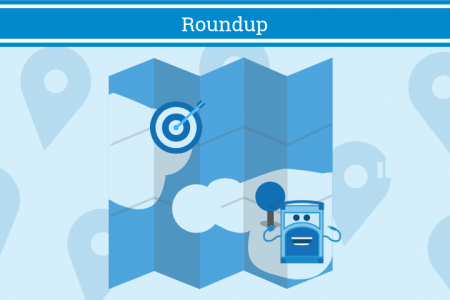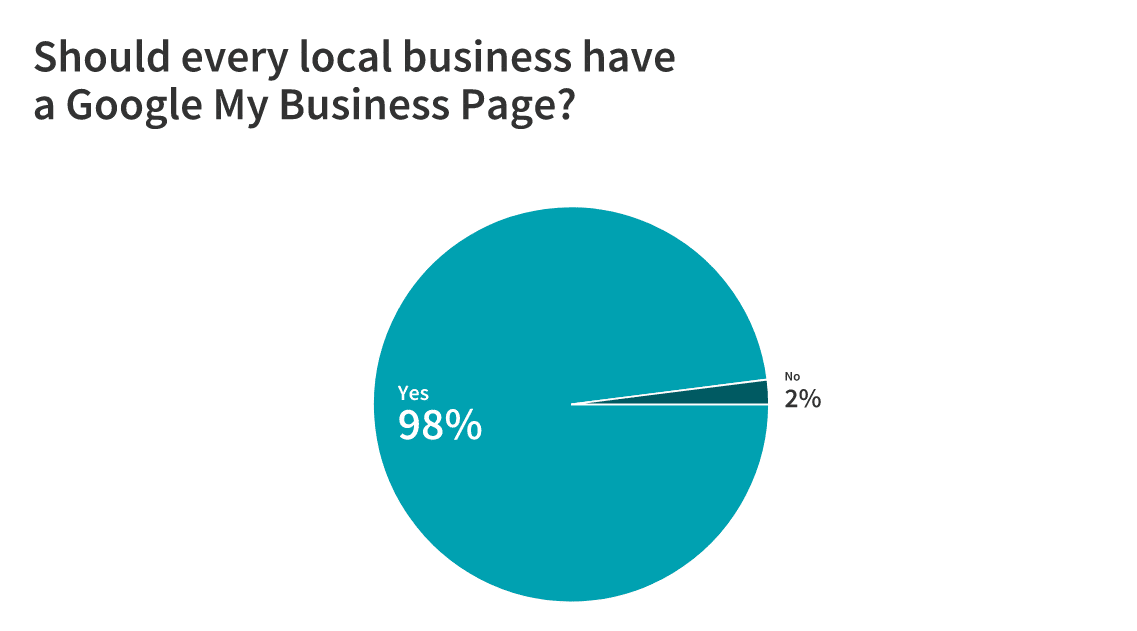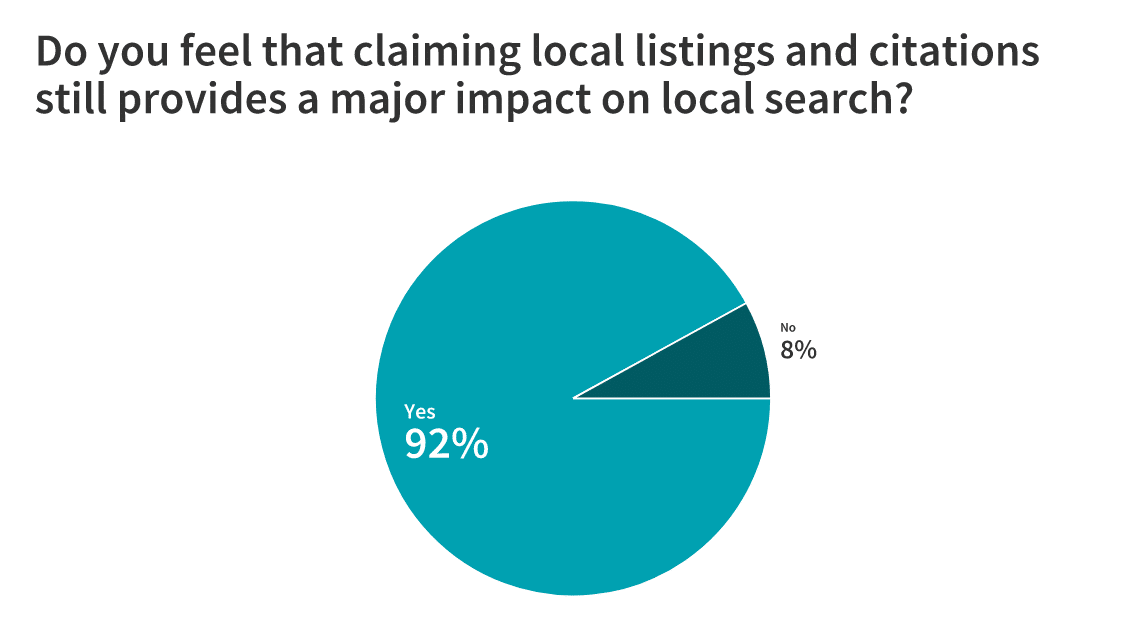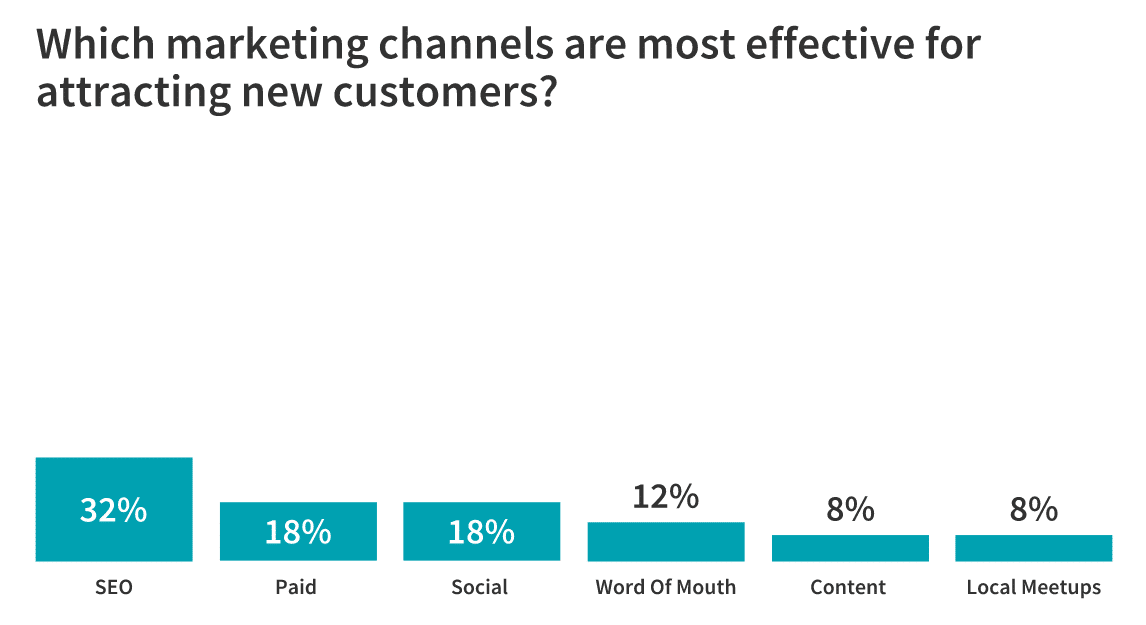Many people often talk about marketing strategies in a very surface-level way. This sometimes means we forget about marketing in our local area. Like many SaaS and online businesses, we forget that we do have a base location and that if we take a little time and work on our local marketing strategy it may open a few new doors for us.
So we decided to reach out and see how others have handled their local marketing, and which marketing channels have proven to be most effective in attracting new customers.
To gather local business marketing tips, we published a survey with four short-form and two long-form questions. 50 marketers shared their insights, successes, and regrets related to marketing locally. We’ll cover their detailed responses later in the article. But first, let’s take a look at the surprising statistics we gathered.
Create a Google My Business page for better search results
When we asked marketers whether every local business should have a Google My Business page, the results were overwhelming. A whopping 98% of marketers answered “yes!” Google My Business helps your local business by connecting with Maps to display your location.
It also lets customers easily call you, message you, access your website and open directions when they search for your website. More importantly, they have an easy way to leave positive reviews connected with you, to help your reputation. And you can easily track how many users engage with your business through your listing.
Also, when we asked marketers whether they feel that claiming local listings and citations still provides a major impact on local search, 92% answered in the affirmative. So make sure to claim your business on Google Maps to boost your local rankings!
SEO remains the best marketing channel for new websites
When we asked marketers, “If a business just launched their site, what marketing channel should they focus on first?” SEO won out, with 32% of marketers naming it.
Interestingly, paid search (the “opposite” of organic search/SEO) was the second-most mentioned channel, at 24%.
Content, a channel that works closely with SEO, came in third with 18%. So, businesses with a new web presence should employ a localized SEO strategy that includes crafting quality content for their audience’s needs, to compete effectively in organic search results.
Other channels named by more than one marketer included local meet-ups (8%), outbound emails and calls (6%), social (4%), and word of mouth (4%).
4% of marketers named multiple channels, in combinations that included the survey’s top responses of SEO, content, and paid (their responses are included in the above statistics).
6% said the best marketing channel depends on the situation, business type, and/or target customers.
Best marketing channel for attracting new customers? SEO
We then asked marketers which marketing channels they found most effective for attracting new customers to their existing business, SEO emerged victorious again, with 32% of marketers naming it. This speaks to the importance of maintaining your business’ SEO regularly.
Paid and social tied for second-most effective, at 18% each. Other channels mentioned by more than one marketer included word of mouth (12%), content (8%) and local meetups (8%), which were also all named by more than one marketer as an effective first channel for local businesses who just launched their website.
6% said that the most effective channels depend on a business’ customers, audience, and/or business type. Another 6% named a mix of methods (when they specified these methods, their answers were included above).
11 mistakes to avoid when marketing your local business
In our first long-form question, we asked our marketers to share the mistakes they made and regrets they had when starting to market their business locally, to help newbies avoid these pitfalls.
1. Failing to strike a balance with social media
Some marketers regretted that they did not harness social media well enough. Irena Zobniow of Insightland says, “I regret that I’ve underestimated, or rather that I put not enough effort into, social media activity like Facebook, LinkedIn and so on. Today, I know that there’s no better way to attract attention and build brand recognition than interaction in real-time with potential local customers. Well-established social media profiles help SEO activities and allow users to contact you in easier ways that they prefer.”
Similarly, Jacob Dayan of Community Tax told us, “I regret not hopping on the social media train even sooner. Having a strong social presence is a symbol of trustworthiness to potential consumers, and it is also a great tool for interacting with customers and answering questions. Twitter has essentially become the new customer service line for many people.”
However, balance is key, as other marketers regretted over-focusing on social media. “I spent too much time on Facebook and Instagram when I started,” says Jacob Landis-Eigsti of Jacob LE Video Production. “You need to constantly be posting on those platforms to grow and it took more time than it was worth. I also focused too much on myself and my business rather than helping my potential customers in any way that I could. I didn’t precisely clarify who my ideal customer was and tailor my content around them, which was a big mistake.”
2. Not developing quality content
James Pollard, The Advisor Coach advises small businesses to invest in quality content from the outset, rather than falling into the trap that he did. “One thing I regret doing is not spending as much time on content marketing as I should,” reports Pollard. “I thought that short, 500-word articles would help me reach prospects. I found that prospects didn’t spend much time on my site and the bounce rate was high. However, when I started putting more time and effort into my content, I got more prospects reaching out to me and the bounce rate lowered, which meant people were going to other pages.”
3. Failing to ensure information accuracy
Posting a consistent name, address and phone number across multiple directories is key, as Kevin Begola from Titanium Buzz attests. “I knew that local directories are fantastic to earn quality links, improve local visibility, and increase ranking in the SERP map-pack but I didn’t take into account that the consistency and accuracy of business information are crucial. I should have made sure that my NAP information (name, address, phone) appeared the same across every local citation I created. Besides, I wish I had created a complete list of my accounts in local citation sites because when I moved to a new store, it was difficult to change my address in all the directories.”
4. Not focusing on existing clients
Don’t forget that your existing customers are your best customers! Not focusing on these loyal customers can be a big mistake, because you’ll lose out on powerful referrals. “I regret not focusing on retargeting my existing and past clients to stay top of mind,” says Tim Evans of Brand You Local Marketing Agency. “It’s a simple way to increase retention and referrals in your business and I wish I would have started doing it when I first started my business.”
5. Not asking for reviews
Many marketers regret not harnessing the power of reviews right away. This was one of the most commonly expressed regrets.
Rachael Jessney of Atelier Studios regrets “not asking all of our customers for a review.” She continues, “Reviews on your Google My Business page are so powerful for improving local visibility.”
Likewise, Ben Lund from DIY Digital Strategy names “waiting in asking for reviews from happy customers” as one of his biggest initial mistakes. Says Lund, “Reviews on your Google Business listing add immediate credibility and help with ranking organically. I hear this from other businesses, that boosting their reviews increase their presence on Google and they get more action.”
Ellen Sluder of RingBoost also says that her “biggest regret is not asking for online reviews sooner.” Sluder continues, “You have to repeatedly ask everyone who comes in contact with your business to review you because only a few will take the time to do so. If you don’t ask, the consumers who proactively leave reviews are the ones who either had their expectations completely exceeded or were utterly disappointed. It can really skew results. A bad review among few initial reviews can have a negative impact, but a bad review among a large number of positive ones is less devastating for a new business.”
6. Not focusing on SEO enough
Alex Nerney of Create and Go says, “The biggest thing I regret doing is not focusing on SEO enough in the beginning. My co-founder Lauren McManus and I always recommend Pinterest for gaining traffic to websites for new bloggers and businesses, so that’s where we started.”
Continues Nerney, “While we still recommend Pinterest because you can get a “win” sooner in your business journey as traffic is easier to get, it’s not as long-term nor is the traffic as quality. Google users tend to stay on the page longer and are more likely to purchase. It’s to your advantage to create content that sells your products and position yourself as an authority to Google on the subject matter your business is about. I can’t stress enough the importance of starting out with some form of SEO on your site.”
Eric Hoppe of Crowd Content advises that businesses new to marketing prioritize SEO, as he’s seen many small businesses struggle with it. “The biggest thing we see local businesses struggling with is not focusing on creating high-quality, SEO optimized content for their websites,” says Hoppe. “SEO takes some time to see rankings improve, so the sooner you can get your content created the better. And, traffic from SEO tends to convert better than traffic from most paid sources, and most searchers prefer to click on organic links instead of paid ones. For these reasons, we always recommend new businesses get the fundamental step of creating their site’s content done as soon as possible.”
Alistair Dodds of Ever-Increasing Circles offers similar observations and advice: “As a Digital Marketer I encounter this a lot with new clients and it’s always the same. They didn’t put the time and effort into fully optimizing their Google My Business (GMB) listing and their wider SEO efforts. Natural search is such a key component of a digital marketing plan, especially for local businesses. When you have a finite geographic market reach it’s essential that you obtain as many leads and inquiries from local prospects searching for your products and services as possible. As such, you need to be appearing in the top 3 Google Maps results as well as the natural search for the highest intent and relevant keywords possible.”
7. Using paid digital ads irresponsibly
Rodney Yo of Best Online Traffic School wishes that he would have spent more time on paid ads. “I regret focusing less on building a good paid search campaign for my local business,” says Yo. “I relied on other channels, which were cheap and ultimately successful, but growth was slow. Paid was a lot more competitive, but I would have learned quickly about what works and what doesn’t.”
However, over-focusing on Google Ads can also be detrimental, as Lane Rizzardini of Marion Relationship Marketing reports. Instead, businesses should spread out their focus across several different marketing methods. “I regret funneling every single client to Google Ads,” says Rizzardini. “Customers typically have 4-7 interactions with a business before buying from them, and these interactions happen across a huge range of different devices and mediums. I think staking your presence in all these places online is much more effective than putting all your eggs into one.”
And businesses should never use paid ads before they are financially ready. “I have seen businesses pay for ads and marketing before they’re making enough to support the cost,” says Stacy Caprio. “It’s much better to start small with events such as local meetups, then word of mouth, then SEO, and from there you can start running paid ads or other more expensive advertising forms once you’re ready to expand.”
Instead of turning to paid ads first, local businesses should choose free and lower-cost options initially, according to Elaine Rose of ReviewInc: “As a PR/Marketing Manager, I see a lot of companies paying for ads to bring in business PRIOR to exhausting all of the free options to attract new customers. First, establish your brand and have continuity across all platforms (Google, Yelp, Social Media, etc.), then secondly, hone in on which paid avenues will benefit your business the most. Being strategic with your ad spend will save you thousands.”
8. Spending money on untrackable ads
Regardless of if your business chooses paid ads, spending money on non-digital ads that you can’t track will likely leave you with regrets, as Steven Sinatra from World Pawn Exchange found out: “I regret spending money on advertising that had no results. We did some TV ads that were offered to us at a good price, but I had a customer come up to me and tell me, ‘I heard your TV ad at 3:00 AM last night.’ Those tricky TV ad reps. Most forms of advertising you can’t track the ROI, but with digital advertising, you definitely can.”
9. Not using specific targeting
Speaking from experience, Josh Wardini of Serpwatch warns that marketing efforts not targeted towards your key audience will fail to deliver results. “When I started my business, the plan was to cater to small and medium-sized businesses in Portland, OR since this was where I was based. I got my website up and running, added a bunch of content pieces which were optimized with keywords I thought I should be going after, and even hired a freelancer to get a link building campaign running. The problem with this was, none of my marketing efforts were geared towards my target market which was small and medium-sized businesses within my area. Needless to say, I had to revamp my entire marketing campaign after just a couple of months.”
Ollie Smith of Energy Seek also regrets “not targeting a specific segment of the market with high-value marketing. Instead, I focused on circulating numerous sales pitches which bore no fruit and cost my small business a considerable amount of valuable time and money in its infancy. If I had to start again – this is the one thing I would change!”
And Ian Keir names not targeting and localizing PR right away as a key mistake: “I regret not doing more PR around the business launch. This isn’t the PR where you send a press release to a bunch of news sites, but more targeted and more local PR (reaching out to local journalists, chambers of commerce, etc. to generate some publicity around the business launch).”
10. Focusing nationally rather than locally
Targeting national keywords rather than local ones initially can also be costly, as some of the marketers we surveyed found out the hard way. “I regret not focusing local first,” says Hannah Attewell of Force of Nature Coach. “When I started, I spread my efforts in SEO and marketing across the whole country, which meant I didn’t have a huge impact anywhere. Once I started to focus locally, I began to see my search rankings and visibility in the area increase massively. This also meant I got to work locally more often and meet people face to face more often, where before I was losing sales because I wasn’t able to have a personal meeting with out of town prospects.”
And many national keywords are too competitive for new local businesses to rank for initially, which some businesses find out the hard way. “I tried too hard to go after national keyword terms that were highly competitive and impossible to rank for with a smaller business/website,” says Thomas Jacobs of Ledger Bennett. “This was a good teaching tactic as it was very difficult to compete and rank on the first few SERPs.”
11. Wasting money on fancy deliverables
Paige Arnof-Fenn of Mavens & Moguls recommends “NOT spending money on things like fancy brochures, letterhead, business cards, etc. Until you know your business is launched,” says Arnof-Fenn, “I would say to put your budget into things that help fill your pipeline with customers. Getting your URL and a website up and running is key. I created online stationery for proposals and invoices, ordered my cards online and made downloadable materials as leave-behinds for people looking for more information to help me find clients more quickly. I know other business owners who spent thousands of dollars on these things and found it was a waste of money. Your story will evolve as you find your market. You need to look professional and have a web site to be taken seriously but embossed paper with watermarks and heavy card stock is not going to accelerate your sales cycle. Find those reference customers quickly, use them to get testimonials and referrals. There is plenty of time later to dress things up!”
8 of the best local business marketing tips
Now that we’ve covered the pitfalls that local businesses should avoid when starting to market, let’s examine the strategies and tactics that are currently working well for local business marketing, as shared by the marketers we surveyed.
1. Encouraging reviews, referrals, and other word of mouth
The most mentioned successful technique by far was encouraging positive reviews from customers. Since prospective customers depend on recommendations from their friends, peers, and others who have had experience with a product, gathering testimonials from satisfied customers is an effective way to increase your customer base. Word will travel fast in your community, so make sure that you’ve built up a positive reputation through reviews!
“Customer reviews are arguably the most effective marketing tool a local business can employ,” says Jacob Dayan of Community Tax. “Reviews are a form of word-of-mouth marketing, which is free and extremely valuable to any business. One of the first things people do when they purchase goods or services online asks other people about it or look at reviews, so positive and honest reviews are critical.”
As Liz Hughes of Blue Bamboo says, “You can’t beat the power of word of mouth. It creates trust, which gives customers the confidence to choose your product or service. Besides the traditional type, digital forms of word of mouth that work really well include Google My Business reviews and website / social media testimonials.”
Christina Brodzky of MediaSesh shares, “I have found it important to focus on review management and encourage customers to leave a review for my business (and my clients’ business) on sites such as Google My Business, Yelp and Facebook. Many customers are highly motivated to only consider a business when there are many positive reviews, so I encourage others to make this a priority from the start since it can take time to build up.”
Thomas Jacobs of Ledger Bennett suggests rewarding customers for leaving reviews. “Encourage reviews and engagement,” says Jacobs. “It’s very tough to encourage positive reviews, but possibly offering a small incentive to leave Google, Yelp, or other types of reviews will vastly improve your visibility on each platform and increase the chances of a user coming to work with your business!”
So, make sure to ask reviews from satisfied customers whenever possible, as Ellen Sluder at RingBoost does. “We include links to our review sites on all receipts and emails, and we train our sales and customer service reps to ask for reviews in every interaction,” shares Sluder. “Online reviews are the next best things to direct referrals/word of mouth. Get on every review site – Facebook, Google, and any local community directories. Even though Yelp has a history of being problematic with their reviews, it can be great for brick and mortar stores. When a review comes in, excerpt it and use it in your social media or other marketing. Any time you can get an endorsement from a third party, your credibility will go up.”
Similarly, Kevin Begola of Titanium Buzz shares, “I ask all my customers to leave a review and give them a small business card with links to Yelp and Google Maps. Businesses with online reviews are better indexed and appear to be more reliable for customers. Online reviews are incredibly important in marketing to new clients because most consumers trust customer reviews as much as personal recommendations which are considered to be the most credible form of advertising. Positive reviews can help customers make a purchase decision.”
Reviews are a great way to build up your reputation on Google My Business, according to Jeff Moriarty of Moriarty’s Gem Art. “After being live for a few years, our best tactic right now is building our Google My Business profile,” says Moriarty. “Anytime a customer purchases something from in our store, we auto-send an email to them asking them to review us on Google. The email has a link direct to the “Review” pop-up on Google, so it makes it extremely easy. It has allowed us to build up a ton of reviews very quickly in 2019.”
And these reviews can help your business climb Google rankings, as Tim Evans of Brand You Local Marketing Agency shares: “Crowd-sourced online review sites like Google Maps and Facebook (among others) play a huge role in determining the success of small businesses. It’s so easy for a prospective referral to check out the local business online. If you don’t have current online reviews, you run the risk of that referral going somewhere else due to the lack of credibility. Reviews help connect you with your customers and can help make them advocates for your business. An additional side benefit for Google reviews is that it supports your Google ranking and authority when customers search Google online for what you do and where you do it.”
Chas Cooper of Rising Star Reviews suggests choosing the customers you encourage to write reviews carefully, rather than asking for reviews indiscriminately. “The two most powerful tactics for getting more customer reviews on sites like Google, Yelp and Facebook are customer readiness scoring and follow-ups.”
Continues Cooper, “Customer readiness scoring means that we only ask a customer to write a review if the business has already made the customer happy. If there’s still work to be done to make the customer happy, then ‘customer readiness’ is not there yet, so we ask for private feedback instead. Then action can be taken to make the customer happy and earn that 5-star review. Or at a minimum, the customer feedback can lead to insights and improvements that make the business better, leading to more happy customers in the future who write 5-star reviews. ‘Follow-ups’ refers to the tactic of emailing or texting a customer to follow up after they don’t respond to a previous email or text. We’ve found that we can often double the number of customer reviews simply by sending 2 or 3 follow-ups after the initial email or text.”
In addition to reviews, another effective word-of-mouth technique is encouraging referrals from your satisfied existing customers—another way to use the trust people place in their peers to your advantage. Of course, for customers to share your business with their peers, you must make sure they’re satisfied!
“Half of our clients are referrals, so word of mouth is still king by far,” says Jimmy Chan from Pixelicious. “Ads, social media and SEO do help fill in the blanks but we discovered that treating our existing clients with the level of service they deserve is the best way to earn new clients down the road. Find ways to make them come back and not to a competitor.”
2. Creating informative content geared toward your audience
Another way to successfully marketing to local customers is to deliver quality content that meets your audience’s needs. “Keeping your content on target is the most effective way to earn and retain trust from your target market,” says Ollie Smith of Energy Seek. “Once you have researched and identified your audience, you should create and disseminate valuable content which will inform and maybe even charm that audience. In addition, avoid creating clickbait and endless sales pitches – this will not add value to and will eventually alienate potential customers.”
Zack Reboletti of Web Focused says, “Write and publish useful, location-specific blog content. The most common thing I see on small business blogs are dozens – if not hundreds – of thin, unuseful blog posts about the business’s products, services, and company in general. The problem is, this content doesn’t do anything to drive new prospective customers to their website (and usually doesn’t do anything to convert them once they’re there either). Instead, try writing longer, more comprehensive content about your geographical area that your prospective customers are actually searching for. Take real estate, for example – a local Realtor can publish blog content about the best local coffee shops, restaurants, gyms, events, and more. While the people searching for these topics might not be ready to buy a house in the immediate future (although some certainly will), they can join your newsletter, follow you on social media, and engage with your site and business in general. That way, when they are ready to buy or sell their house, they think of you!”
As Chloe Brittain of Opal Transcription Services attests, quality content creation must go hand-in-hand with diverse link building. “ I’ve found HARO to be a good source of high-quality and relevant links. The first couple of months of using HARO, I saw a significant boost in rankings and traffic. Pitching bloggers on HARO and guest blogging on high-quality sites has helped to increase my site’s traffic steadily over the past year. However, I want to continue to diversify my link building, so over the next few months, I plan to spend less time on guest posting and more time on creating content for my own blog and promoting it on social.”
And content marketing is about more than creating your own blog at the outset. “I am a big fan of Content Marketing and Thought Leadership which are great ways to build your organization’s brand, increase your visibility more broadly, raise your profile and attract more clients/customers,” says Paige Arnof-Fenn from Mavens & Moguls.
Continues Arnof-Fenn, “Activities like speaking at events, writing articles, building your following on social media all contribute to increasing your awareness with potential customers and building your credibility with a larger community. Instead of trying to start your own blog or newsletter, try contributing regularly to existing well-trafficked blogs in your industry or newsletters of like-minded organizations reaching the same target audience as you. Make sure you put your URL or contact info on it so they can find you and follow up. When your articles or talks become available online, make sure to send them out via social media to all your friends, followers and contacts. Start small and build as you go.”
Don’t underestimate content platforms like Reddit, Pinterest, and Quora for boosting your reputation. “I’ve had huge success in driving engagement and brand awareness through helpful content generation that we’ve pushed at customers via all these “secondary” ad platforms such as Reddit, Pinterest, and Quora,” says Lane Rizzardini of Marion Relationship Marketing. “They’re still incredibly cheap and an easy way to get traffic to your website that you can then nurture and remarket to. It’s resulted in vastly improved Search Advertising results and Revenue increases month over month. We’ve taken one brand from doing literally zero business to 60-70k in monthly revenue in six months in the competitive jewelry industry.”
3. SEO, including with Google My Business
Many marketers speak to the success of SEO, and how they’ve optimized it. In fact, this was the second-most mentioned successful strategy after encouraging reviews. “SEO is a strategy that I implement daily,” says Lisamarie Monaco of PinnacleQuote Life Insurance Specialists. “I create meaningful content daily, and optimize my existing articles daily. A successful blog with good content is how I am generating my leads naturally. It is imperative to keep up with your blog every single day in some way, shape or form.”
Optimizing for local SEO is key – and reviews and listings play a large role in how businesses are ranked. “The number of local listings a business has across multiple directories, the amount of information each listing contains (text, product and location photos, videos, store policies, hours, etc), and the number of reviews are what directly impact local SEO,” says Rio Rocket. “Five-star rated businesses are given the highest visibility. Local SEO can also be improved onsite through local business schema. This is a structured data markup code added to a business’s website to help search engines identify the type of organization you have and what it offers to your customers.”
Thomas Jacobs of Ledger Bennett recommends optimizing for both national and local SEO at once: “Optimize your website around the highest traffic national terms and include a geo qualifier in front of it to lower the competition level and localize. The ability to compete at a local level will be much easier initially once a site is launched to add a City or a State (or combination) behind your highest value service offering. This is a great place to start in the first year of SEO tactics.”
Another often-overlooked but effective technique is optimization for voice search. Says Irena Zobniow from Insightland, “In my experience, one of the best tactics that is working well for me is: optimizing the website for voice search which is more and more popular thanks to, for example, Google Assistant. It is the future, and we need to be prepared for it as soon as possible because the impact of voice search is already visible.”
A Google My Business page, which the vast majority of marketers agree every local business should have, is also key for the best SEO results. “Listing your business on Google My Business could be of great help in increasing your chances to rank your business on Google,” shares Manvi Agarwal from SocialPilot. “Customers love stories and details, and GMB is exactly helping me do that. One of the stats by Google has stated that ‘businesses which continuously keep updating photos on their listings tend to receive 42% more requests for directions on Google Maps. They also get 35% more clicks through to their websites.’ “
Jacob Landis-Eigsti of Jacob LE Video Production states, “Adding 100 photos to my Google My Business Page increased my number of views and calls significantly. I made sure my Google My Business and Yelp listing included the words that people search which have increased the number of calls I’ve received. Getting backlinks from relevant and local news outlets, directories, and blogs have been helpful for ranking higher in the search. Increasing my web traffic and then retargeting ads using a Facebook Pixel and Google Analytics has dramatically increased my number of leads for my local business.”
David Alexander of Mazepress also shares, “The best tactics that have been working well for local SEO over the past few years and remain strong include Google My Business. Ensure you are generating a healthy volume of reviews that keep your overall rating as close to 5 stars as possible. Create local citations to send positive signals as to your authority and location. Consistent addresses and details are essential in optimizing these opportunities. Use press release campaigns to generate backlinks. Also, use PPC with Google Adwords to test what works and what doesn’t in a short space of time. The data you can collect using this approach in 1-3 months will help you refine your organic SEO that might take several months to start bearing fruit.”
In addition, diversification with SEO is key. Says Eric Hoppe of Crowd Content, “We’re seeing a lot of customers succeed by creating city pages for all the metros they serve. A huge focus of local SEO is optimizing your Google My Business account and getting featured in the local pack in search results, but that’s just part of it. In many industries searchers prefer to look outside the local pack when searching, so ranking in the organic listings beneath the local pack is critical. Think of the example of people looking for retirement homes – chances are they’re not going to click on the map and instead look at companies’ websites. In contrast, searches for restaurants will almost exclusively click on the map.”
Hoppe goes on to say, “Many companies also serve metros where they don’t have a physical location, which means they can’t get a GMB account for that area. For them, ranking in the organic results beneath the map is the best way for them to capture local search traffic. In both cases, creating local landing pages and city pages is an effective way to start ranking in the organic results for the high-value local search terms. We’ve seen many clients see dramatic ranking improvements in a matter of months after adding city pages for metros they serve.”
4. Specific, local targeting
Local targeting is also key, accomplished both through local SEO and through other methods. “Location-based keywords have really helped in ranking my site and reaching my target market,” says Josh Wardini of Serpwatch. “I have a landing page for every location-based keyword I’m targeting. This helps keep my homepage clean while still bringing in qualified leads. And, no matter what anyone tells you, directory listings play a vital role in the marketing of [small and medium-sized businesses]. These days, customers turn to directory apps or websites to find the information they need about a local business. That said, it is important that you claim your listing and make sure that the information is up to date.”
Ben Lund of DIY Digital Strategy recommends a diverse set of targeting methods. “Local listings are still relevant and have a big impact, especially Google Business Listings. Lund also recommends “remarketing. It’s simple, if anyone visited your site and didn’t take action, have an ad to get them back to your site. Launch Google Search Ads, but just for a very specific set of keywords that are relevant to your business. Also, use Facebook Ads, targeted locally to relevant audiences.”
Hannah Attewell of Force of Nature Coach maintains that localized content and networking are essential to local targeting, and can even compensate for not having as many backlinks: “Focus not only on local SEO but on making sure that content is locally focused – writing about the local community. Similarly, become part of the local business community the old fashioned way with in-person networking. This is, in turn, allows for more local content. I rank on page 1 for my target local keywords despite having fewer backlinks than my competitors. I put this down to copywriting that ties to the location without feeling forced. I also find that I get a significant amount of traffic from well-optimized images – I include location in my file names and alt tags so that I have great visibility on local searches.”
Also, never underestimate the power of social media for targeting your local audience. Jeff Arnett of Arnett Credentials says, “Facebook business marketing is incredible. Facebook is able to hyper-target prospective customers, not just based on common demographics like location and age, but very specific details such as relationship status, job title, political views, even recent life events like a marriage or birth of a child. Figure out your product or service’s target audience and reap the benefits of all that Facebook’s business marketing platform has to offer.”
Alistair Dodds of Ever Increasing Circles recommends that local businesses “put some budget toward paid social promotion on Facebook/Instagram. Set up either a lead or traffic campaign that is targeting your local prospect audience,” says Dodds. “Offer them a coupon, early bird special or some kind of inducement that is of interest to your market. Set up a reach campaign to target those who engaged with your lead or traffic campaign but did not quite complete the registration action you wanted. This retargeting will give you a higher chance of converting those that showed initial interest and your actions should only cost pennies typically.”
5. Building relationships
But never lose sight of the humanity of the community you do business in. Building genuine, offline relationships is crucial, as Christina Brodzky of MediaSesh attests. ” I find that attending local meetups and networking events to be an incredibly powerful way to promote my business,” says Brodzky. “Even though it’s 2019 and the digital era is thriving, these networking events have been a more affordable and effective way for me to get my growing business name out there. I’ve also dedicated time to having separate one-to-one meetings with people from local meetups so we can get to know each other better and develop a trusting business relationship. After all, why would someone put their name on the line and refer you if they don’t know you that well, and vice versa?”
“Building relationships with people who are influential with my target audience is extremely effective,” agrees David Sanchez from Mammoth Web Solutions. “I’m not talking about social media influencer marketing, though—I’m talking about real people I know who work day-in and day-out with my target audience. I build relationships with them and help them, asking for nothing in return. But as a response to genuine concern, building relationships and helping them out, people of influence refer people to me on a regular basis and actively promote my business.”
6. Paid ads
Although they aren’t always the most cost-effective option for new small businesses, paid ads can help you target quickly and gather data on what works for your audience. “We are spending some money on paid ads and that’s working particularly well,” says Alex Nerney of Create and Go. “It helps us position ourselves in front of our target market and does so at a cost that is much more appealing from an ROI perspective than more traditional marketing channels. While it does cost money upfront, especially if you’ve never advertised before and don’t have an understanding of the advertising platforms on the different social media channels, you can validate your concept much quicker and get sales sooner.”
7. Text message (SMS) marketing
Don’t overlook text message marketing, also known as SMS marketing, because of the need for customers to opt-in. The opt-in aspect has plenty of advantages, as Robert Bentz of Purplegator attests. “If you can only do one thing with mobile marketing, it should be SMS text message marketing,” says Bentz. “Text message marketing is opt-in marketing, meaning that you must first have permission to send a client or prospect a text. That fact often keeps small businesses away from it, because it seems like a daunting task to get opt-ins from consumers. But, it’s precisely why it works so darn well. When else do you hear about customers asking to receive your advertising?”
Chas Cooper of Rising Star Reviews can also vouch for the power of SMS marketing, based on experience. “We are a global SaaS company that helps local businesses market themselves. In the early days, we failed to see the power of SMS marketing,” says Cooper. “We used email marketing to help local businesses get more reviews from their happy customers on sites like Google, Yelp, and Facebook. But we didn’t use SMS text messages in addition to email. We thought that SMS text messages would be too “interruptive” to customers, and would turn happy customers into unhappy customers. Then one of our member business owners made a very compelling case for SMS. He regularly asked all his customers what method of communication they would prefer. The majority said they’d prefer SMS over email. That changed our perspective entirely. So we implemented a new feature that let businesses send either email or SMS messages to their customers to ask for reviews. Since that time, more than half of our member businesses now use SMS. I only wish we had seen the light sooner and supported SMS right from the start.”
8. Using a mixture of local business marketing tips
Finally, local businesses should never put all their marketing eggs in one basket. Instead, they should use a variety of techniques tailored to their community audience, as Steven Sinatra of World Pawn Exchange shares. “We are posting on Facebook regularly, to stay top of mind in our local community,” says Sinatra. “We also run giveaways occasionally, and that generates a lot of excitement, and page likes. We also share our posts into a large local Facebook group that has news about the community. We get exposure to a lot of people that have never heard of us before that way. We also do content creation, which has doubled our traffic to our site in the last 6 months. We post weekly to our Google My Business listing and add pictures regularly. We’re getting over 13,000 photo views a month, and our area only has around 30,000 people.”
Continues Sinatra, “Google Ads are very effective. Google has made sure of this because it’s how they make their money. Positive word of mouth is always the most solid because you are getting referrals from trusted sources. We use Google Ads, but we did it right. We made sure we only pop up for searches that we want to pop up for. We also researched to see what people were searching for and used that in our research. Of course, the number one thing is to be a good business. You can do everything else perfectly and still fail. Treat your customers very well, and be fair, and you will do great.”
Key takeaways
Starting to market your business locally? Use these local business marketing tips based on our surveyed marketers’ recommendations.
- Make sure to ask for reviews from satisfied customers, to enhance your reputation online and offline.
- Target your audience carefully. Focus on your local market – don’t just aim for a wider national audience.
- Focus on improving SEO results, particularly local ones, by creating valuable content for your audience, ensuring the accuracy of your directory info, and emphasizing your location on your website. This is a low-cost, effective way to attract new customers
- Create a Google My Business profile, update it regularly with photos, and take advantage of the Google Reviews feature.
- Claim local listings on sites like Google Maps.
- Build meaningful offline relationships in your community.
- Remember that your existing customers are your best customers.
- Be cautious about how you use paid digital ads – and don’t choose untrackable offline ads.
- Consider SMS marketing, since customers make the choice to opt-in.
- Balance your use of social media carefully.
- Harness the power of referral marketing and word-of-mouth within your community.








